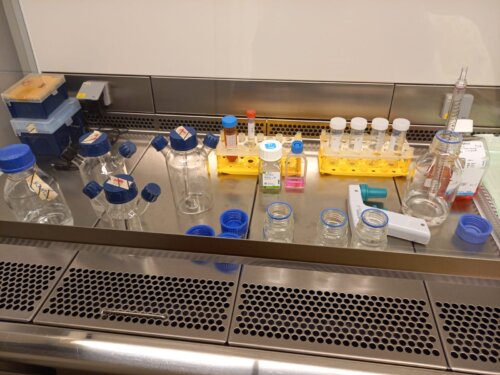January 29, 2023
How to find a thesis/research project?
Hej all!
Finding a research project can be a daunting task, but with a little guidance and some work, it can be manageable.
Currently, I am working on my 1st year project for my master’s which is about skin tissue engineering – pretty cool, isn’t it? (Below is a photo of what I’m doing almost daily.) But I have also done my bachelor’s thesis here. Additionally, I work a few hours per week at a start-up company. I had to search for each of these positions by myself so here are a few tips to help you find your research project/thesis at the university and at the company:

1. What to do?
The first step is to determine what field of study you are interested in. This can be done by reviewing literature in your field, attending seminars, and talking to professors from your subjects. Start with a broad topic. Pick a subject that you are interested in and have some knowledge of, but make sure it is broad enough to allow for further research and exploration. Once you have a general idea of what you are interested in, you can start to narrow down your search by asking yourself some questions. What specifically are you interested in? What specific problem or question do you want to investigate? With all this in mind, you are ready for the next step!
2. Where to search for a project?
One way to find research projects is to look for open calls for proposals. Many companies post calls for proposals on their websites or general websites where you can find work offers such as Glassdoor, Indeed, Graduateland or LinkedIn. These offers will typically outline the research areas that they are currently funding, and provide a general description of your topic. However, sometimes there can be guidelines for submitting your own proposal.
Another way to find research projects is to look for ongoing research studies in your field. You can do this by searching for publications in your field or you can also look into joining a research lab or group at your university. Often, these labs or groups are actively working on research projects and may be looking for new members to join their teams. This can be a great way to get hands-on experience and work with more experienced researchers. LiU has all the research listed here. You can choose your own area and go through everything that is happening here at LiU. I’m not sure about other areas but in biology, we generally, look inside LiU for specific groups when we want to find our thesis projects.
Otherwise, you can search for projects at other universities. It usually looks the same because most of the universities will have their research listed on the official page. It can be overwhelming because each website will be built differently however, at the end it is about your future so don’t give up! This scrolling through websites may pay you off well!
3. How to search for a project?
Asking for a project is by far the most important part. When you apply for it at the company make sure your CV is well-written and prepare yourself for the interview. If you don’t hear from them within a couple of days after your application, don’t hesitate to contact them. After the interview, it is usually very good if you follow up. But there are plenty of pages online on how to do it correctly. I’m not a coach so I won’t write about this much but treat this seriously. You must show that you care and it is important for you!
If you’re interested in a company that doesn’t have any openings right now don’t hesitate to contact them! Perhaps they are thinking of one but haven’t put this up yet? They would appreciate that you are proactive. And the worst that can happen is that they will say no. But what if they say yes…?
When you contact researchers via email – be brief but clear. Don’t write pages of text about your interest in the field with all the details in it. They already know that – they are experts. So when you’re writing your email, be fairly concise as they don’t have time to read essays and they are getting lots of emails every day. So state clearly what you’re looking for, the number of credits, when it should happen and then state in a sentence or two why you’re interested in this field. Maybe you can mention a previous project that was related to this already. If you don’t have previous experience that’s fine as well – just say you’re interested and would like to explore this area more. Perhaps, you can propose a meeting.
Ultimately, finding a research project is about being proactive and resourceful. It takes time and effort, but with the right approach, persistence and determination, you can find a project that aligns with your interests and career goals.
Good luck!
/Alexandra, Experimental and Medical Biosciences
________________________________________________________________________________________________
Why don’t continue the conversation with us?
Start with checking out:
Our programmes, the application process, webinars, and our Instagram and Facebook account.
Still left wanting more?Book an appointment with our recruitment coordinator at infocenter@liu.se.




